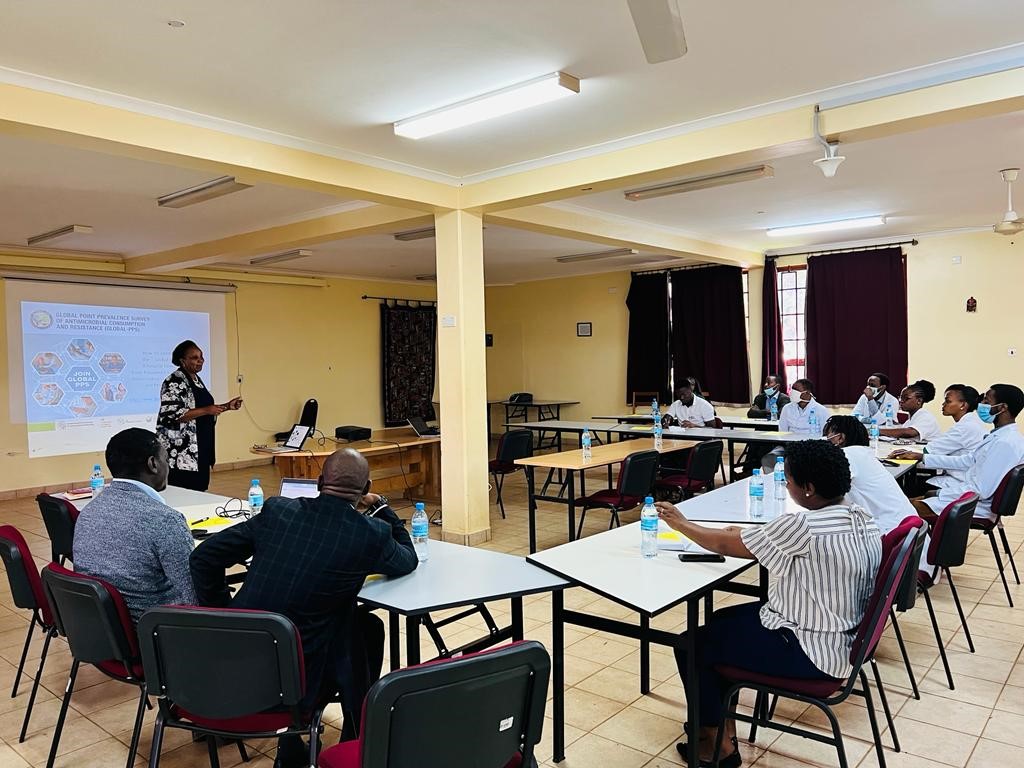Northumbria – Tanzania CwPAMS Project 2
22 August 2022

Northumbria Healthcare NHS Foundation Trust and Kilimanjaro Christian Medical Centre (KCMC) have worked together for over 20 years on a number of healthcare projects. Our partnership has brought some incredible achievements – from introducing laparoscopic surgery to supporting the development of the first burns unit in Tanzania.
In 2018 our partnership embarked on a new area of work, supported by CwPAMS, to promote antimicrobial stewardship (AMS) and we were privileged to be asked to join the project team and connect with colleagues in pharmacy and microbiology at KCMC to look at how we could de-escalate the use of antibiotics in the hospital and the surrounding local communities. As our colleague, Professor Eva Muro states:
“Antibiotic resistance is a huge challenge in Tanzania. Antibiotics are over-used and can be costly, not just for the patient financially, but the effects on their health over the long term.
There was much to be done around behaviour change and our initial CwPAMs project enabled us to address this locally through many ways, like hosting a public Antibiotic Awareness programme and upscaling our laboratories to increase testing”
(Associate Professor Eva Prosper Muro, Ag. Dean Faculty of Pharmacy, Head Pharmacology Department, Kilimanjaro Christian Medical Centre)
The project saw us visit KCMC for the first time and it was a fantastic experience – the motivation of the teams to support and engage in the project was nothing short of amazing. It was also a huge learning curve for us though in seeing the multi-faceted challenges the hospital, and indeed the country, faces in tackling antimicrobial resistance.
What the team achieved through project one was incredible but we can safely say it gave us all even more determination to continue to work together and build on this work further.
And so, in 2021, we did just that! The team wanted to look at AMS more broadly across the country and through the CwPAMS extension, we were delighted to be joined by five new hospitals – Muhimbili University of Health and Allied Sciences, Dodoma Regional Referral Hospital, Mawenzi Regional Referral Hospital and later, Mbeya Regional Referral Hospital and Mbalizi Regional Referral Hospital too – enabling us to undertake project work which could impact across a huge geographical area and many diverse populations. Our larger project team meant we could share thoughts and experiences from all of our different organisations to identify the best areas of focus and look at what we could develop which could be offered across Tanzania but also implemented locally to promote AMS.
Over the space of just a few short months – and after many, many Zoom calls, flights, bus journeys and Whatsapp messages and spreadsheets amongst us – a number of key results were achieved:
“We have developed a set of public health resources aimed at healthcare workers and community health services to promote decreased prescribing of antibiotics locally – valuable assets in promoting AMS”
(Dr Betty A Maganda, Head of Pharmaceutics and Pharmacy Practice, Clinical Pharmacologist Muhimbili University of Health and Allied Sciences)
“We undertook Global Point Prevalence Surveys in each of our organisations which was hugely insightful, enabling us to better understand where improvements could be made around infections and prescribing habits”
(Bernard Mbwele, Quality of Health Care, Mbeya College of Health and Allied Sciences)
“The project has helped to inspire our pharmacy colleagues to become more engaged and enthusiastic about AMS – it has been brilliant to see!”
(Deonisia Daud Kazinyingi, Pharmacist, Mawenzi Regional Referral)
“Our partnerships saw us set up a natural ‘AMS network’ all committed to promoting AMS in our respective organisations and more widely across Tanzania”
(Bernard Makala, Clinical Pharmacologist, University of Dodoma)
We are all incredibly proud of what has been achieved so far and feel privileged to be part of this truly collaborative team.
Whilst both projects brought some great successes, they have also served to highlight where the challenges continue and that there is still much to be done.
There is certainly no quick fix to embedding AMS and our projects have served to show that it’s as much about cultures and behaviour change in our organisations and communities as it is about creating the relevant resources and protocols to support this – the two must work together.
We’re a great team and our ambitions and our partnership’s focus on AMS continues.


0 Comments
Leave a comment
Your email address will not be published.